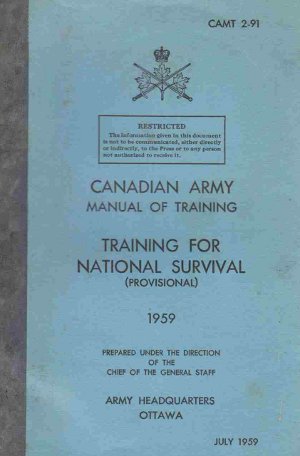Topic: Canadian Army

Government Adding 15,000 to Regular Forces
The Ottawa Citizen, 8 September, 1961
By Greg Connolley, Citizen Staff Writer
 Gravely concerned over the belligerence of Soviet Premier Khrushchev and the mounting Berlin crisis, the Canadian government is boosting its regular armed forces by 15,000 men and creating a reserve army civil defence force of 100,000 men.
Gravely concerned over the belligerence of Soviet Premier Khrushchev and the mounting Berlin crisis, the Canadian government is boosting its regular armed forces by 15,000 men and creating a reserve army civil defence force of 100,000 men.
These measures, announced in the Commons by Prime Minister Diefenbaker, will cost taxpayers an additional $35,000,000 for the remainder of this fiscal year alone.
Mr Diefenbaker said he did not want the government plans to be interpreted as contemplation of an early outbreak of war. Rather, this was an insurance any prudent government would take as a precautionary safeguard.
Buildup Details
In detail the increase of the regular armed forces will be as follows:
1.—Forces assigned to the North Atlantic Alliance will be boosted by 1,749 in the navy, 1.106 in the army brigade with an additional 1,515-man reserve in Canada, and 250 officers and men in the air force division in Europe.
2.—The regular forces at homes, particularly the strategic reserve, will see the army strength increased by 8,960 men and the RCAF by nearly 1,000 personnel.
3.—Canadian militia regiments will be authorized to enlist 100,000 men to take special six-week courses in civil defence survival and rescue operations.
To make possible these increases to the regular forces, the government has passed orders-in-council boosting th ceiling on personnel strength in Europe from 12,000 to 14,000 and the overall limit of armed forces from 120,000 to 135,000.
This will mark the first major buildup of the Canadian services since the Korean war.
Prime Minister Diefenbaker said this should not be regarded as a "provocative act" but rather as an indication that Canada will stand solidly with its North Atlantic Treaty Organization partners.
The proposals for the armed forces outlined by Mr. Diefenbaker are expected to have a substantially beneficial effect on the unemployment situation.
Opposition Leader Pearson reserved detailed comment on the increase in the armed forces until government policy objectives are made clear in the forthcoming defence debate.
Mr. Pearson did declare that" the only way we now have to ensure national survival is to prevent war, to abolish war as a part of national policy, because war now means general nuclear destruction."
From the CCF New Democratic Party came criticism of the government action by spokesman Bert Herridge (Kootenay West).
"We cannot agree the present situation is best met by increasing the power of our military and our armaments. We urge the government to use moderation at this time."
Mr. Herridge urged the government to continue to press for the United Nations police force, placing less emphasis on Canadian forces.
The prime Minister said the increases in the NATO-assigned troops would be accomplished by the transfer of fully trained personnel from home establishments.
Starting Immediately
Recruitment of the 15,000 men for the three forces will begin immediately.
Mr. Diefenbaker told the House that while the militia now had a strength of 42,000 many more trained men would be needed in the event of a nuclear war, both for civil defence and to support regular army field forces.
Along with these measures by Mr. Diefenbaker Defence Minister Harkness reported to the Commons on steps taken to accelerate the army's national survival program.
Steps to Survival
These included:
1.—Partial manning of emergency military headquarters.
2.—Establishment of army headquarters for "each likely target city."
3.—Purchase of additional stocks of food, vehicles, blankets, clothing and medical supplies, dispersed outside target cities.
4.—Expedite the nuclear detonation and fallout reporting system.
5.—A speedup in the survey of fallout protection offered by national defence properties.
6.—Ensuring the emergency broadcast system is brought into being as early as possible.
7.—Acceleration of the installation of the warning siren system.

